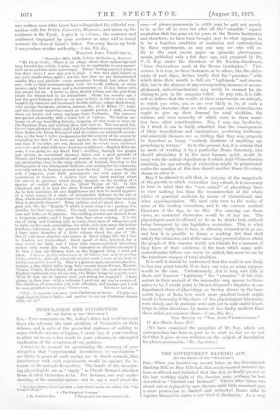" December 20th, 1846, Schloss Reidenburg, Bregenz. "Mv DEAR Cuiu —There
is an adage about short reckonings and long friendships, which, I opine, may be as applicable to correspond- ence as to matters moro mercenary. Hence, having received yours a few days since, I now pay you in kind. I was very glad indeed to see your handwriting again ; not the less that we are domesticated amidst Alps and glaciers—some seventeen hundred foot above the sea—with as little communication with the world without, as stoop passes, eight feet of snow, and a thermometer, at 11 dog. below zero can secure for us. A letter is, then, doubly a boon, and the post-hour rivals the dinner-bell in its attractions. About ten months ago, I had the good-fortune, when on my way to Italy, to fall in with a very beautifully-situated and handsome Gothic schloss, yolopt Reidenburg, with antique furniture, pictures, armour, &o., all in Ritter [P] taste, and this, though somewhat smart as regards pocket, I took, moving down my horses and camp equipage from Carlarnho. The summer was passed pleasantly, with a house full of visitors. We laid an em- bargo on all our travelling friends, stopping all who went or came by the Sprottau Pass, and making them halt with us. This was good fun, for we have plenty of hocks, and I had the fortune to carry away with me from Baden tho Gross Herzog's* chef do cuisine, an admirable article, whO, at the hour I write, compensates for the scarcity of the season by reminding me that if we have not zephyrs, wo have venison pasties, and that if cowslips are out, chamois are in—ainai nous rdglerons noire vie—and what with seine Austrian neighbours—English there are none, I was going to say thank God !—strolling through the gorges and valleys, an occasional pleasant letter, and a good sprinkle of French and German periodicals and papers, we carry on far more to our satisfaction than in the rainy climate of Ireland, listening to the l3illingsgate of two blackguard factions, and waiting for the massacre, now only select, to become general over the land. I see your English and, I suppose, your Irish newspapers are very angry at the annexation of Cracow. I believe that they know nothing about the matter in question, which simply depends on the reading of a species of codicil added to the Allied Treaty of '15. In this subjoined Act it is that the three Powers affirm their right exists. As to this necessity, let any Englishman say how he would approve of a rebel colony in a state of independent defiance in the Isle of Man, which should be a storehouse for treason and it refuge for traitors. That is precisely Cracow I Hang politics, and all about them. I am glad you like my " Knight,"t which is more than I do; perhaps I'm gladder, for that very reason. The book treats too much of gentle- men and ladies, to bo popular. One-shillingreadors are derived from a twopenny public, and I forgot that fact when writing. It is the era of slang and Cockney talk to write down men of education and to write up the mob, prescribing, the while, this very same distinctive attribute, education, as the panacea for every ill, moral and social. I have somo thoughts of a little volume about the size of St. Pat.,'X with some sketches and stories of Tyrol village life, for I live in Austria, not Switzerland. Don't speak of this, however, for it may never see light, and I know that unaccomplished intentions reckon with many (the trade, for instance) as abortive attempts.§ In fact, I hug my idleness hero as the happiest thing I ever yet know. I have a perfect abhorrence of all labour, but most of writing books, which is, after all, about the sorriest mode a man of my taste or feeling can get his bread by. This is a glorious spot, mountain glaciers, ravines, a lake thirty miles long, Italy twenty hours distant, Munich, Vienna, Venice, Switzerland, all accessible, and the road to us from England a pleasant trip all the way, the Rhine being the grande route. What do you say to coming over, and seeing for yourself P I have plenty to show you—with a welcome I need not say you're certain of. The children all remember you with affection, and madam and I will
be most gratified to see yon.—Yours ever, CHARLES LEVER.
" P.S.—I suppose ydu pass your Christmas at home. I'd give my right hand to have a father and mother to oat my Christmas dinner with.—C. L."






























 Previous page
Previous page